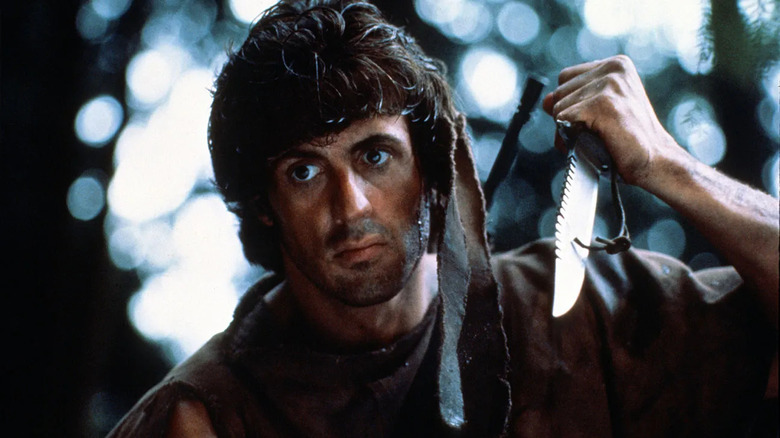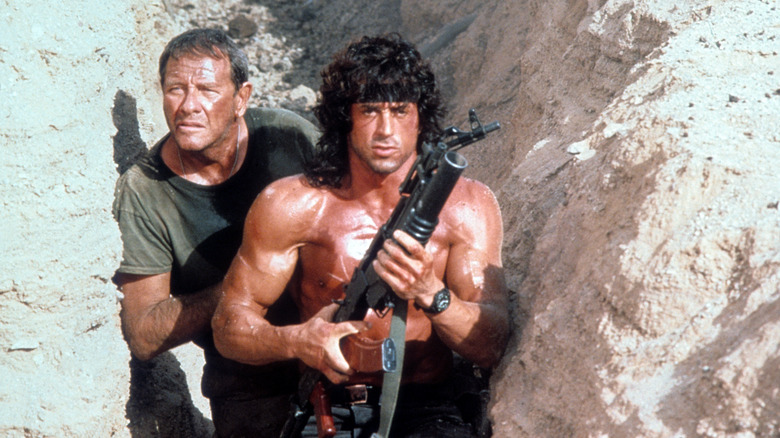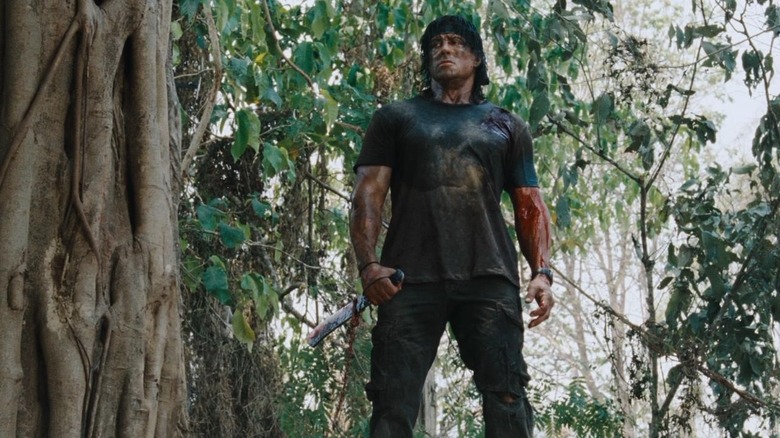The Correct Order To Watch The Rambo Movies
If you want to enjoy some often very good and often very bad action movies, the "Rambo" franchise is for you. And if you want to watch the strange and often disturbing trajectory of America's political core over nearly 40 years of cinema, the "Rambo" franchise is also for you. By accident or design, Sylvester Stallone's famed action series contains multitudes. They're macho, violent, ridiculous one-man-army movies. They're also propaganda, apologies for propaganda, and then propaganda again. They demand popcorn, and a crowd ready to hoot and holler. But also analysis.
But few film franchises outside of "Fast and Furious" have titles as confusing as the "Rambo" movies, which defy common logic and may have you, the John Rambo newbie, wondering if there's a trick to watching these things. Honestly, the key is to watch them in order of production. It's the only way to appreciate the series' loose continuity and, more importantly, appreciate how they reflect America's political priorities in a given period. Whether you're showing up for the muscles and machine guns or the historical study (or both!), these are movies best watched without any frills or fancy skipping around. The evolution, and sometimes devolution, is a key feature of "Rambo" fandom.
There's only one correct order, really
People who enjoy film titles with a clear and consistent continuity ... look away! The titles for the "Rambo" movies in production order, the only true order in which to watch them, may break a piece of your brain and render you unable to go about your daily life.
- First Blood (1982)
- Rambo: First Blood Part II (1985)
- Rambo III (1988)
- Rambo (2008)
- Rambo: Last Blood (2019)
Of course, there is some method to the madness here. The first movie is based on the 1972 novel "First Blood" by David Morrell, so of course it has that title. It was only after that film's smash success, when the lead character's name started becoming its own kind of shorthand, that the "Rambo" series started becoming the "Rambo" series.
That first film also stands beyond the rest of the series in other key ways, too. Despite that '82 release year, it's very much a remnant of '70s New Hollywood cinema: a character-driven, cynical, dark-as-hell drama about a broken man navigating a broken nation. Director Ted Kotcheff takes the material seriously, and John Rambo — haunted Vietnam War veteran battling PTSD and also the dumbass cops who targeted him for just existing — is an unforgettable antihero, played unforgettably by Sylvester Stallone.
In the original book, Rambo dies by suicide. The film's original ending followed suit. But that changed. Rambo survived. And a franchise was born. If you want to only watch a single "Rambo" movie, the only one that is truly, undeniably good without several asterisks, "First Blood" is the one to watch. From there, it gets complicated.
A franchise at war with itself
By the time "Rambo: First Blood Part II" went into production, the political atmosphere in the United States, and in Hollywood, had changed. American audiences didn't want a movie about the sins of their nation and the men we abandoned after throwing them into a needless war. They wanted a movie about an unstoppable American badass who could win every battle and solve every problem. With muscles and machine guns, of course. The "Rambo" series took a hard turn to the right, going jingoistic. It went even harder with "Rambo III," a film that plays like a two-hour propaganda video dead-set on ending the Cold War. Between that and "Rocky IV," Sylvester Stallone made a habit out of transforming once humble characters into the fists of the Reagan administration. No matter your political beliefs, the results are fascinating — watching the broken man in "First Blood" go from barely surviving to shooting down a Soviet helicopter with a bow and arrow in just three films is a surreal experience.
After a 20 year break, Stallone returned to the series, this time stepping into the director's chair. The bafflingly titled "Rambo" is an odd film, a throwback to the first movie in terms of scale and intimacy, but also an action film with a bloodlust so powerful that it makes the original sequels look positively tame. The politics of the fourth film are all over the place, messy and muddled (perhaps by design, to reflect an older Rambo's lack of direction and contentment), but it's an undeniably effective film, especially for action fans who like their fight scenes to have a distinct horror edge.
In 2019, Stallone closed out the series with "Rambo: Last Blood," a staggeringly bad movie whose knee-jerk, reactionary politics are as ugly as anything in the original sequels. Time has allowed us to view "Rambo: First Blood Part II" and "Rambo III" with enough distance to roll our eyes more than wince. "Last Blood," with its Mexican villains and border fears, is too fresh to enjoy on a historical level and too ugly to embrace as an action movie. Let's revisit this one in a decade or two, when it becomes an interesting artifact. Only then will we be able to fully and properly study all five films. Goodness knows there's a lot going on here.


